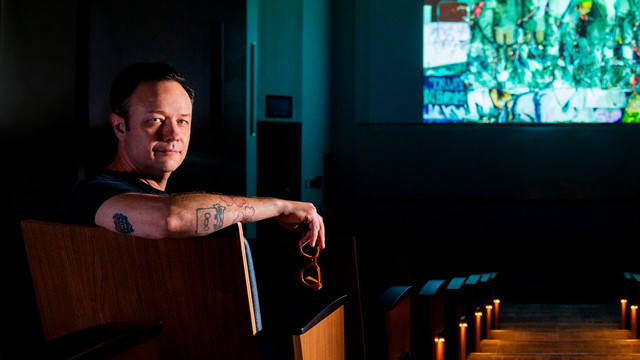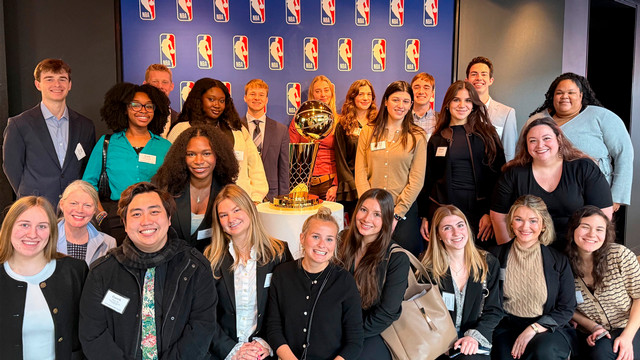Alicia Díaz, associate professor of dance, and Patricia Herrera, professor of theatre, presented two new short films at New Spiritualities: Film as Ritual at the Institute for Contemporary Art at VCU. The program recognized their collaborative project, ruinas/ruins, developed through long-term artistic research at the abandoned sugar mill in Central Aguirre, Puerto Rico. Díaz and Herrera collaborated previously on an award-winning dance film.
Learn more about Spring ’26 course offerings & electives.

Student Interest Fuels New Africana Studies Program
Students for the first time are taking courses in the new Africana Studies program at the University of Richmond.
“The push for this program was strong, and students can now major, minor, and receive degrees in Africana Studies,” said Ernest McGowen, the program’s coordinator. “It is a great opportunity to direct one’s studies toward their interests and fulfill our liberal arts mission.”
McGowen and other faculty members collaborated with students to create the program, following a student-driven proposal for UR to offer Africana Studies as an academic option.
The Africana Studies program launched with interdisciplinary courses and programming in the humanities, arts, and social sciences. The program explores the complex socio-political landscapes, economic structures, and cultural traditions that shape, impact, and stem from the African diaspora.
Events
Faculty Highlights
Matthew Oware, Irving May Professor of Human Relations, published “Race and Space in Rap: Conceptions of (Multi)Racial Identity and Urban Life in Rap Music” in The Arts and Urban Development.
Matthew Oware, Irving May Professor of Human Relations, received the 2025 Distinguished Educator Award from the University of Richmond at Colloquy.
Alicia Díaz, associate professor of dance, reflects on the MAPA dance project in “Excavando juntas en el paraíso,” in categoría cinco. The collaborative performance took place in the ruins of the Cine Paradise, a former movie theater in downtown Río Piedras, Puerto Rico.
In the fall semester of 2020, the University of Richmond faculty overwhelmingly voted to create an Africana Studies program. This was a milestone in a grassroots undertaking begun by students during the spring of 2020. It was guided by skilled faculty and grown in alliance with alumni, staff, and community members seeking an intellectual space within UR in which critical analysis of blackness could take place.
Africana Studies is an academic concentration that critically examines the African diaspora from multidisciplinary and interdisciplinary perspectives. Through a wide variety of courses and programming in the humanities, arts, and social sciences, the Program explores the complex socio-political landscapes, economic structures, and cultural traditions that shape, impact, and stem from the African diaspora.
Africana Studies considers how “blackness,” as a racial construct, and the concept of race itself influence and are constitutive of the modern world’s development. A multilayered intellectual enterprise, the Program’s interrogations begin not with race as an assumed concept but as a site of profound epistemological and ontological meaning-making that must be considered in relation to gender, class, nation, ethnicity, religion, and sexuality.
Faculty and students interested in Africana Studies come from a diverse range of backgrounds. The Program serves people from a range of varied ethnic, racial, gender, sexual orientation, economic status, and ideological spectrums as it strives to foster inclusion and equity. Program participants bring to the field a depth of skills and breadth of disciplinary strengths. As such, the program serves as an intellectual center and touchstone for those interested in using innovative avenues of theoretical and empirical investigation to explore the African diaspora.
Designed to provide curriculum that includes broad humanistic and social science traditions as well as extensive social and behavioral theoretical foundations as intrinsic components of study, the Program aims to provide students with interdisciplinary knowledge, skills, and competencies. Through well-designed courses and collaborations with community partners, it engages students inside and outside the classroom.
The Africana Studies Program prepares students for a wide range of academic and professional fields relevant to public, private, and civil-society sector careers. The interdisciplinary nature of Africana Studies allows for a rich and challenging course of inquiry, benefiting students with interests in history, policy, culture, language, law, foreign affairs, visual and performing arts, and education, among other fields. A major or minor in this area will provide an invaluable foundation in critical thinking, research, writing, and analysis; skills that form the core of a liberal arts education.
There are no limits to what students can do with an Africana Studies degree. The Africana Studies Program formally launched in the fall of 2022. Join us.






